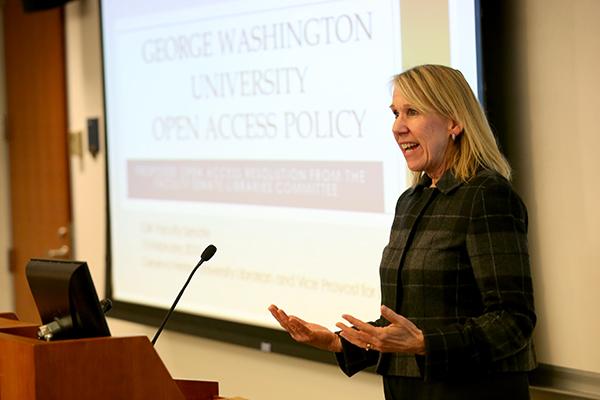Top administrators will decide this spring whether GW should make research by faculty members freely available online.
The Faculty Senate narrowly approved a resolution Friday to make professors’ scholarly works “open-access resources,” which means they’d be available to the public through a digital platform that GW’s library created in the past year.
If administrators and the Board of Trustees approve it, the change would make it easier for GW to archive research completed on campus, University Librarian Geneva Henry said.
“This lets people know what our research is and what they are working on,” she added. “It is a huge benefit for underdeveloped nations that cannot possibly afford these journal subscriptions.”
But members of the Faculty Senate have argued that an open-access policy could be difficult for professors who publish in journals that own the copyright to the scholarly works. Highly-regarded journals like the New England Journal of Medicine don’t allow researchers to make the reports available for free because they retain the work’s copyright.
If faculty members are publishing in that type of journal, they’ll have to submit a waiver to the provost’s office. Henry said it would be easily accepted.
More than 600 institutions around the country have adopted open-access policies, including some of GW’s peer schools like Duke and Northwestern universities.
Gelman Library has struggled to pay for journal subscriptions, which grow more expensive by about 10 percent annually because of inflation. While open-access resources would allow the library to maintain work done at the University, it would still need to subscribe to journals to access work by researchers at other institutions.
If more institutions move to open-access policies, it could put pressure on scholarly journals to change their business models. More schools have moved to open policies, including the Massachusetts Institute of Technology, where Provost Steven Lerman said he advocated for the change.
“The intent of this is to exert gradual and continuous pressure on the publishers,” Lerman said. “In some fields, it’s moved them to more open access in granting waivers. In some, it hasn’t.”
Edward Robinson, a professor of forensic science and member of the Faculty Senate libraries committee, said some publishers are resisting the trend toward open access, and that many require an exclusivity period during which others can’t publish the material.
Robinson said publishers and authors often face a conflict: The publisher does not want to resort to open access to collect subscription fees, but the author hopes to release his or her work so more people can view it.
“There are still some powerful go-to journals – which have the reputation of being the place to publish your research, depending on your field – and they know they have tremendous power, and they can say no to open access,” Robinson said. “This will slow down what many feel to be an inevitable transition to open access.”
The National Institutes of Health moved to an open-access policy in 2008 years ago, requiring that any research conducted with NIH funding be available online for free after attempts to make the process voluntary weren’t successful, Henry said.
Matthew Kay, an associate professor of biomedical engineering, said he has used open-access journals to publish and look at other research.
“People still have in their mind the gold standard or the holy grail of publishing your research,” he said. “Those are not all entirely open access, but it’s still what we really strive for because publishing in those journals is thought of as being the pinnacle of what you want to do as a scientists. But the open-access journals are gaining popularity.”
Jacqueline Thomsen contributed reporting.







